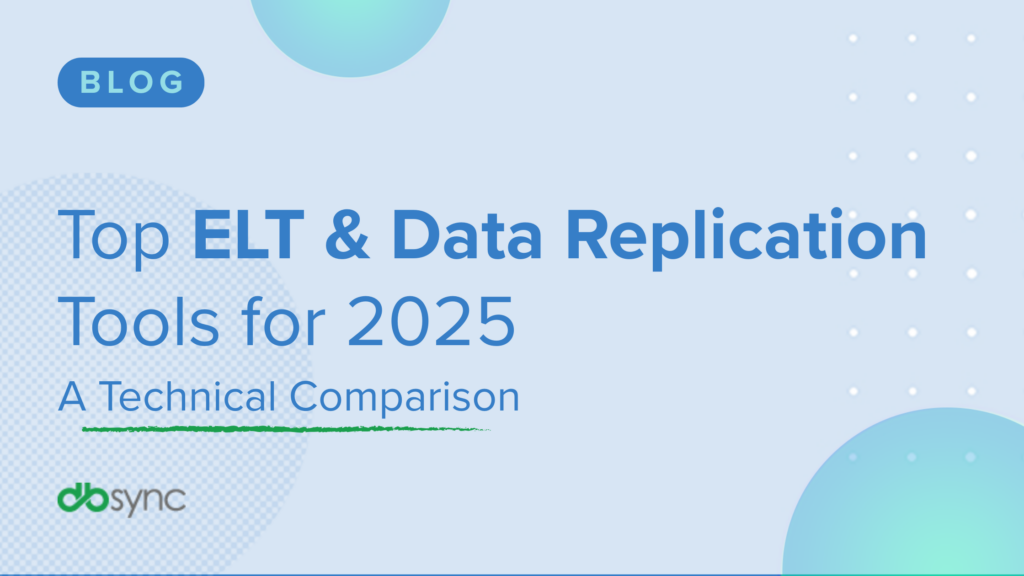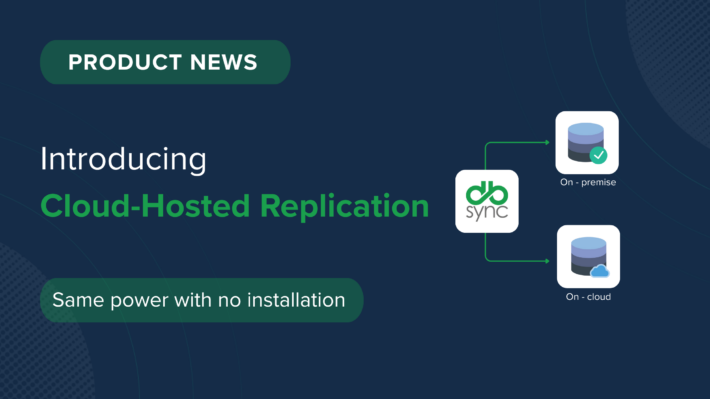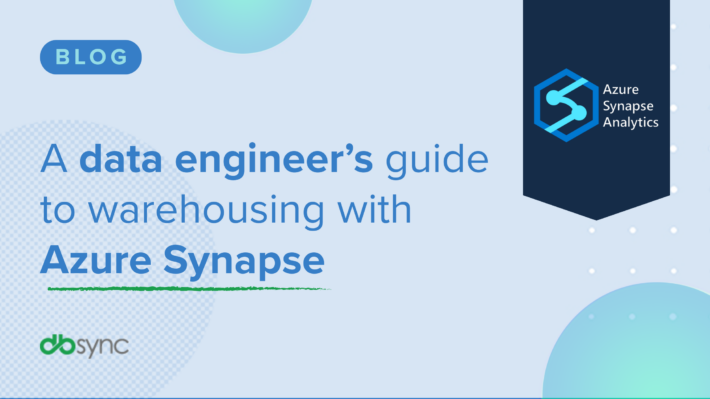Top ELT & Data Replication Tools for 2025: A Technical Comparison

For a lot of data teams, it seems like ELT has been pulling ahead of traditional ETL for analytics-heavy jobs, but raw speed isn’t everything. They still need reliable orchestration, clear monitoring, and the ability to fix what might break at 2 a.m.
The problem, usually, is a fragmented toolchain. Many data teams patch together ingestion tools, transformation engines, schedulers, and alerting layers, only to find they’ve rebuilt a fragile pipeline with opaque dependencies and heavy maintenance costs.
On the flip side, fully-managed “black-box” ELT services look easy until you hit edge cases, schema drift, or complex business logic. And suddenly your team’s flying blind.
So we thought we’d do the digging for you.
This guide compares 5 leading ELT and data replication tools: Fivetran, Airbyte, DBSync, Hevo Data, and Talend. We’ve evaluated them across critical decision points: connectors, performance, scalability, orchestration trust, data quality, pricing, and security.
Whether you’re syncing SaaS app data into Snowflake, moving transactional updates into a lakehouse, or building a hybrid pipeline with some no-code and some CLI, this article helps you pick the right tool for your stack, your team, and your budget.
Before we dig into the tools and what they offer, here’s details on how and why we picked what we picked.
Selection criteria & methodology
To help you assess the right data replication or ELT platform, we focused on real-world engineering needs: balancing performance, reliability, usability, and security. To ensure our assessment was grounded in practical application and unbiased, we’re sharing the evaluation criteria:
- Connectors & pipeline control:
We assessed each tool’s connector coverage across CRMs, ERPS, databases, warehouses, cloud lakes, and event sources. We also evaluated support for custom connectors via API or SDK. For orchestration, we looked at scheduling options (cron), event-based triggers (file drop, webhook), and manual/API-based runs.
- Performance & scalability
We measured bulk-load speeds, log-based vs. trigger-based CDC, checkpointing, and support for exactly-once delivery. Reviewed scalability for high-volume workloads, micro-batching, real-time ingestion, and infrastructure elasticity (auto-scaling or serverless). We also considered end-to-end latency from source update to destination sync.
- Reliability & data trust
We evaluated each tool’s ability to detect, report, and respond to issues. Checked dashboards for monitoring run statuses, throughput, and error visibility. We checked how these tools notify for failures, SLA breaches, or anomalies. We also looked at built-in data quality checks (row counts, nulls, schema validation), profiling and drift detection, and lineage tracking.
- Pricing model
We compared pricing models and their parameters, including overhead and hidden costs such as connector usage, API calls, and support tiers, etc. We’ve included “free” and open-source options for teams exploring self-hosted options.
- Security & compliance
We assessed encryption and secure network deployment options (e.g., VPC peering), and access control features like RBAC and SSO. Checked for compliance standards like SOC 2, HIPAA, and GDPR to assess enterprise-readiness.
- Ease of Use
We reviewed each tool’s UI and the availability of documentation, tutorials, templates, and community support. Also looked at CLI tools and SDKs for code-first teams.
Top ELT & Data Replication Picks
For each platform, we’ve broken down its key features, deployment options, and ideal use cases. Our goal is to present an unbiased and balanced view, highlighting not just where each tool excels but also the scenarios where it might not be the best fit.
Fivetran
Fivetran’s data movement platform is trusted by mid-market and enterprise teams for its breadth of connectors, automated schema management, and simplicity. It prioritizes low-maintenance data replication and integrates with most cloud data platforms.
Connectors: Connects to 700+ sources including SaaS apps (Salesforce, NetSuite, Marketo), databases (MySQL, Oracle, Postgres), and file systems. Major destinations include Snowflake, BigQuery, Redshift, Databricks, and Azure Synapse.
Deployment: Fully managed SaaS platform. Recently announced support for hybrid deployment.
Compliance & Security: SOC 2, HIPAA, and ISO 27001 compliant. Offers SSH tunneling, data masking, and audit logs. Could not find any mention of role-based access control.
Support: 24/7 global support via email only. Critical SLAs, success manager, and account managers only available for enterprise plan and above.
Key Features & Value Props:
- 700+ pre-built connectors
- CDC for multiple databases
- Built-in transformation support via dbt Core
- Cloud and Hybrid deployment options
- Metadata API for data lineage and orchestration
Ideal Use Cases:
- Perfect for those standardizing on cloud data warehouses.
- Organizations that prefer end-to-end managed pipelines without budget constraints
- Teams with fast-scaling data who value automation and low overhead
When to avoid Fivetran:
- You require non-standard ELT pipelines
- On-premise or self-hosted deployment is critical
- You need strict cost predictability at high data volumes:
DBSync Cloud Replication
DBSync is purpose-built for companies seeking reliable, customizable, and secure replication across SaaS apps, databases, cloud warehouses and lakes. Unlike general-purpose ELT platforms, it specializes in deep integrations for CRMs, ERPs and compliance-heavy use cases, making it especially well-suited for industries like healthcare, finance, and manufacturing.
Connectors: Supports a range of sources like Salesforce, Microsoft Dynamics, Business Central, and popular databases. Compatible with most popular destinations including Databricks, SQL Server, Snowflake, Redshift, and more.
Deployment: Flexible deployment options including fully managed cloud, on-premises, and private cloud. Ideal for compliance-sensitive or air-gapped environments.
Compliance & Security: HIPAA and SOC 2 Type II compliant. Supports data encryption at rest and in transit. Offers VPC deployment, audit logs, and secure credentials management.
Support: 24×7 Live chat and email support along with dedicated customer success managers and support SLAs.
Key Features & Value Props:
- Purpose-built historical and batch replication with minimal downtime or data loss
- Lowest latency CDC for database replication
- Advanced schema mapping and data validation options
- Flexible deployment option: SaaS, on-prem, private cloud.
- Built-in monitoring with configurable alerts
- Can combine ELT + ETL for hybrid or complex, multi-stage data flows
Pricing Snapshot: Transparent pricing model starting from $499/month based on consumption. Offers custom pricing for large-scale or highly regulated deployments.
Ideal Use Cases:
- Companies needing highly customizable pipelines with specific pre/post transformations
- Hybrid/cloud environments with unique security or compliance requirements
- Technical and non-technical teams requiring simple setups for complex flows
- Strict cost predictability at high data volumes
Airbyte
Airbyte is an open-source data integration platform gaining traction among engineering-led teams for its flexibility and extensibility. Airbyte requires teams to build, modify, and self-host connectors while also offering a managed cloud version for ease of use. It’s a suitable for teams seeking control and customization without vendor lock-in.
Connectors: Supports 500+ connectors. Connects to warehouses like Snowflake, BigQuery, Redshift, Databricks, and lakehouses like S3 and Delta Lake. Offers both source and destination SDKs to build new connectors.
Deployment: Available as open-source (self-hosted via Docker/Kubernetes), and managed SaaS on cloud.
Compliance & Security: Cloud version is SOC 2 Type II certified. Open-source can be hardened with enterprise security policies. Includes role-based access control, data encryption, and audit trails in enterprise version.
Support: Community support for open source, paid support tiers available for enterprise and cloud plans. Dedicated Slack, and email support for managed plans.
Key Features & Value Props:
- Open-source and extensible connector framework
- Declarative YAML configurations with connector SDKs
- dbt-native transformations
- Incremental sync, full refresh, and CDC support
- Great for building custom pipelines and internal tools
Ideal Use Cases:
- Teams with in-house engineering looking for full control
- Startups building internal data stacks
- Enterprises seeking open-source tools to avoid vendor lock-in
- Scenarios requiring highly custom source integrations
Cons:
- Requires engineering effort for setup and maintenance
- Managed cloud offering is built for organizations with small or steady data needs
- Lacks advanced monitoring features in OSS version
Matillion
Matillion is a cloud-native data integration and transformation platform. Positioned at the intersection of ETL and ELT, Matillion offers deep transformation capabilities and is designed for analytics use cases that primarily require flexibility, governance, and scale. It is suitable for large organizations with complex data pipelines.
Connectors: Connects to 100+ data sources including SaaS applications, databases, and file stores. Integrates with leading cloud data warehouses like Snowflake, Redshift, BigQuery, and Databricks, with strong focus on transformation within these destinations.
Deployment: Offered as both SaaS and self-hosted
Compliance & Security: SOC 2 Type II, HIPAA, GDPR, and ISO 27001 compliant. Supports role-based access control, SSO, and private deployment.
Support: Paid plans include business-hours or 24/7 support, depending on SLA tier. Enterprise plans offer technical account management and implementation guidance
Key Features & Value Props:
- Visual designer for building complex data transformation
- Push-down ELT that transforms data inside the warehouse
- Full support for Python, Bash, and SQL for advanced scripting
- API and CI/CD integration for data ops
Ideal Use Cases:
- Enterprise data teams working on complex, multi-stage pipelines
- Businesses needing high control over transformation logic and orchestration
- Environments with hybrid cloud infrastructure
- Teams looking to embed data ops into CI/CD pipelines
When to avoid Matillion:
- Steeper learning curve for non-technical users
- Higher cost compared to other ELT tools
- Less intuitive and complex for no-code first teams
Hevo Data
Hevo Data positions itself as an intuitive, fully-managed ELT platform built for real-time data replication across cloud data warehouses and business apps. It emphasizes automated pipelines with minimal engineering effort.
Connectors: Supports 150+ sources, business apps, databases, and cloud storage. Compatible with 10 destinations like Snowflake, BigQuery, Redshift, and Databricks.
Deployment: Fully cloud-hosted solution with no self-hosted or hybrid options.
Compliance & Security: GDPR & SOC 2 Type II compliant. Other critical security and governance features available for enterprise plans only.
Support: Standard support via email and chat; Dedicated SLAs only available for enterprise.
Key Features & Value Props:
- Auto-schema mapping
- Built-in transformation capabilities
- CDC options for high-volume ingestion
- Unlimited historical syncs at no extra cost
- Monitoring and alerting from the UI
Ideal Use Cases:
- Teams needing quick onboarding with minimal engineering
- Near real-time analytics across SaaS + cloud DWs
- High-volume syncs where parallelism is critical (e.g., >10TB/day)
When to avoid Hevo data:
- Low latency use cases where low lag is needed (sub-minute latency)
- You need customizable transformation for complex pipelines
- If hybrid/on-prem deployment is critical
Talend
Talend positions itself as a comprehensive data integration and transformation platform with a focus on data quality, governance, and observability. Now part of Qlik, Talend is suitable for enterprises with hybrid and multi-cloud data environments.
Connectors: Talend supports a wide range of sources and destinations across databases, SaaS apps, cloud platforms, and big data ecosystems.
Deployment: Talend’s deployment options include cloud-native (via Talend Cloud) and hybrid.
Compliance & Security: Compliant with SOC 2, GDPR, & HIPAA along with support for RBAC & SSO
Support: Paid support tiers include 24×7 enterprise support & dedicated customer success teams. Knowledge base, and community support is available for all plans.
Key Features & Value Props:
- Visual ETL/ELT designer via Talend Studio
- Built-in Data Quality & Profiling tools
- Metadata management and lineage
- Governance dashboard for data trust
- Code generation for deployment in Spark, MapReduce, etc.
Ideal Use Cases:
- Enterprises with strict data quality and governance needs
- Hybrid/multi-cloud data landscapes
- Organizations needing both batch and real-time pipelines
Reasons to avoid Talend:
- Steeper learning curve compared to newer no-code platforms
- Can be resource-intensive at scale
- Higher TCO for budget-constraint teams
Other data replication tools to consider
Beyond our primary shortlist, several other tools are worth exploring depending on your architecture and team preferences.
Apache Airflow
Airflow isn’t a replication tool per se, but it’s a leading orchestration layer for teams building custom data pipelines. It provides powerful DAG scheduling, retry logic, and plugin extensibility, often used alongside open source tools or custom CDC frameworks.
Informatica
Informatica is an enterprise-grade platform with strong support for ETL/ELT, real-time replication, and data governance. It’s best suited for large organizations managing complex, regulated data environments and legacy systems.
Database Native Tools
Many databases and platforms offer native tools, but with their own limitations. While solutions like Microsoft SQL Server Replication and Oracle GoldenGate provide deep, high-performance integration, they are largely confined to their specific environments, making them complex and costly for cross-platform data movement. Similarly, tools like AWS DMS and Salesforce Connect are excellent for their native clouds but lack the broad connector support needed to unify data from diverse SaaS apps, databases, and on-premise systems into a single destination. Third-party ELT platforms are preferred because they provide a single, scalable solution with a wide array of pre-built connectors, simplifying the entire data integration strategy across a company’s heterogeneous data sources.
Choosing the best tool for your use case
There’s no single “best” ELT tool, only the best fit for your architecture, skillset, and growth stage. Here’s how to break it down:
Data Integration Across Apps?
If your pipelines span CRMs, ERPs, and accounting systems, not just databases, you need a platform built for data integration.
DBSync and Talend stand out here with strong pre-built connectors, workflow logic, and native support for business apps beyond the warehouse.
Database-centric Replication?
If your primary need is replicating data between databases, warehouses, and lakes, with speed, scalability, and CDC, Fivetran and DBSync offer robust log-based replication and near real-time performance with minimal overhead.
Need full customization & code control?
If your team prefers to define everything via code, routing data through dbt models, Airflow DAGs, or Prefect flows, Airbyte fits well. It’s open source, Python-friendly, and extensible, but assumes you have engineering bandwidth.
Budget, scale & hosting constraints
- Need control over costs? Compare volume-based pricing (Fivetran, Hevo) vs. flat-fee models (DBSync).
- Want to self-host? Airbyte offers open-source versions; DBSync provides on-prem self-hosted deployment with managed support.
- Prioritize scalability? Look for tools with auto-scaling pipelines and serverless architecture.
Final thoughts
| Your Need | Best Fit |
| Integrate SaaS & business apps | DBSync, Talend |
| Replicate databases at scale | Fivetran, DBSync |
| Custom, code-first pipelines | Airbyte (with Airflow or Prefect) |
| Budget-friendly, predictable pricing | DBSync |
| Self-hosted options | Airbyte, DBSync |
As this guide has shown, there is no single “best” ELT or data replication tool for every use case. The ideal platform is a function of your unique data stack, team’s technical skills, and budget. While some tools, like Fivetran and Hevo Data, excel as fully managed, volume-based solutions for general-purpose SaaS and database replication, others, like Airbyte, offer the flexibility and control of open-source for engineering-led teams.
Meanwhile, platforms such as Matillion and Talend stand out for their robust transformation capabilities and governance features, catering to complex enterprise environments. The key is to match a tool’s core strengths, whether it’s simplicity, customization, or cost predictability, with your specific operational requirements. We recommend you deep-dive into the tools that align with your specific needs. Most platforms offer a free trial or open-source version, providing an opportunity for hands-on evaluation.
If your needs lean towards stringent compliance requirements (like HIPAA and SOC 2), predictable costs, or flexible deployment options, feel free to explore DBSync Cloud Replication. You can try the free trial or book a demo with our experts to see how DBSync can help.


